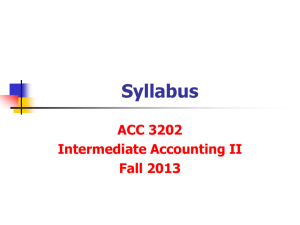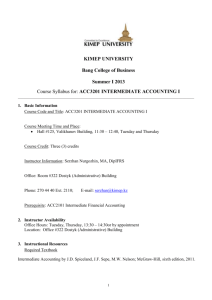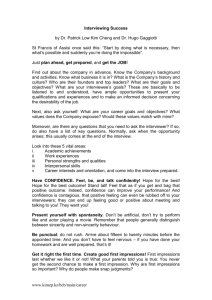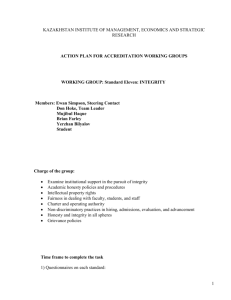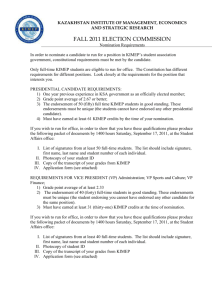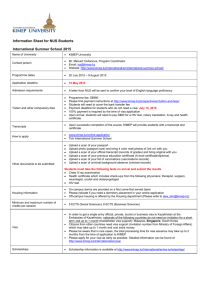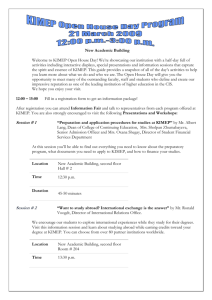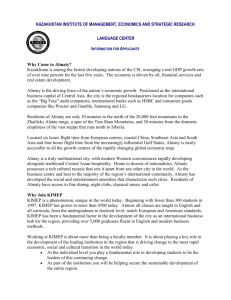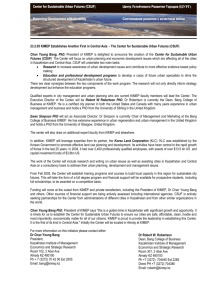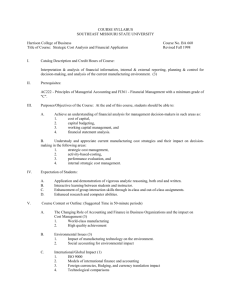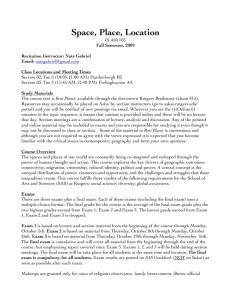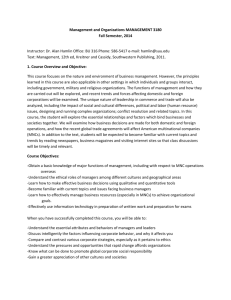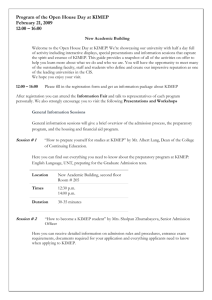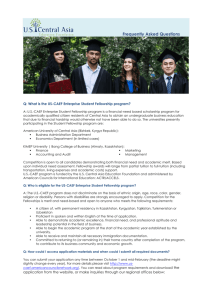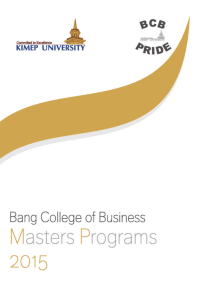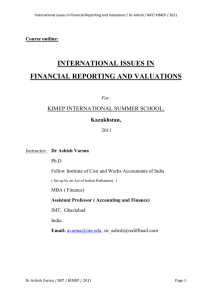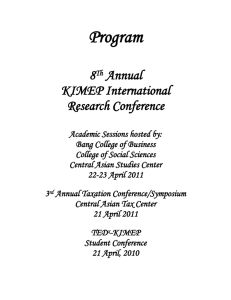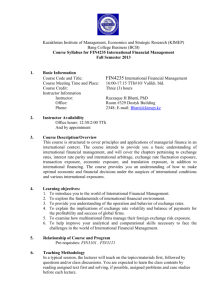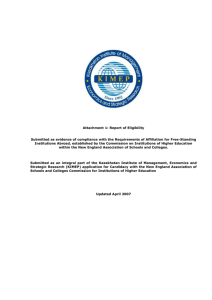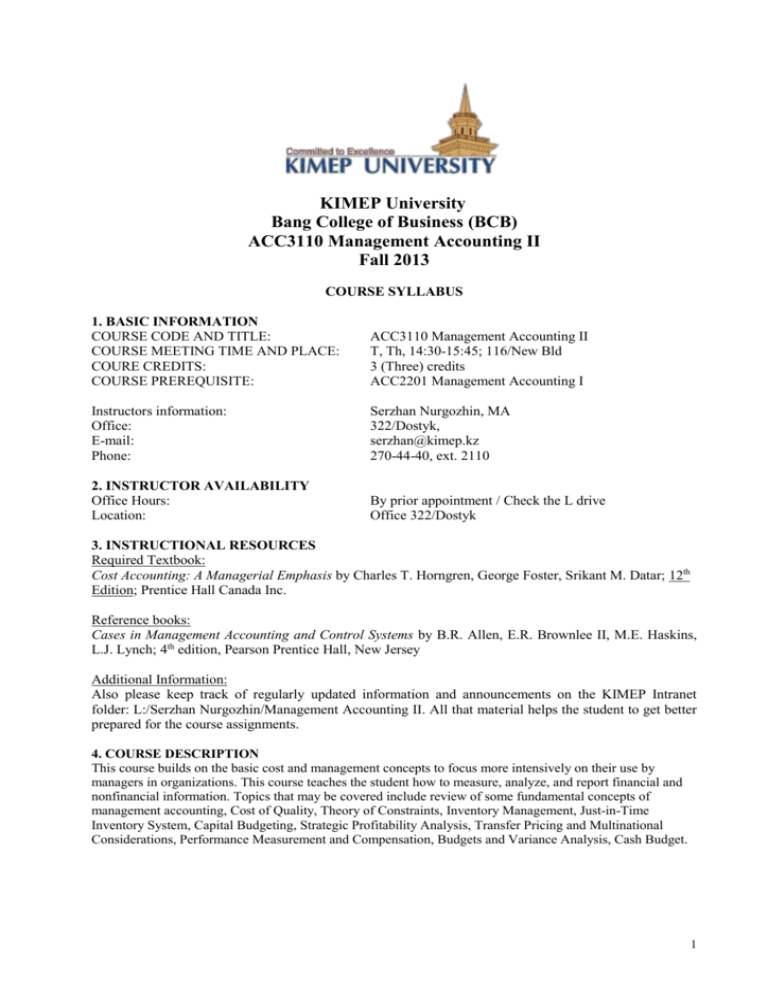
KIMEP University
Bang College of Business (BCB)
ACC3110 Management Accounting II
Fall 2013
COURSE SYLLABUS
1. BASIC INFORMATION
COURSE CODE AND TITLE:
COURSE MEETING TIME AND PLACE:
COURE CREDITS:
COURSE PREREQUISITE:
ACC3110 Management Accounting II
T, Th, 14:30-15:45; 116/New Bld
3 (Three) credits
ACC2201 Management Accounting I
Instructors information:
Office:
E-mail:
Phone:
Serzhan Nurgozhin, MA
322/Dostyk,
serzhan@kimep.kz
270-44-40, ext. 2110
2. INSTRUCTOR AVAILABILITY
Office Hours:
Location:
By prior appointment / Check the L drive
Office 322/Dostyk
3. INSTRUCTIONAL RESOURCES
Required Textbook:
Cost Accounting: A Managerial Emphasis by Charles T. Horngren, George Foster, Srikant M. Datar; 12th
Edition; Prentice Hall Canada Inc.
Reference books:
Cases in Management Accounting and Control Systems by B.R. Allen, E.R. Brownlee II, M.E. Haskins,
L.J. Lynch; 4th edition, Pearson Prentice Hall, New Jersey
Additional Information:
Also please keep track of regularly updated information and announcements on the KIMEP Intranet
folder: L:/Serzhan Nurgozhin/Management Accounting II. All that material helps the student to get better
prepared for the course assignments.
4. COURSE DESCRIPTION
This course builds on the basic cost and management concepts to focus more intensively on their use by
managers in organizations. This course teaches the student how to measure, analyze, and report financial and
nonfinancial information. Topics that may be covered include review of some fundamental concepts of
management accounting, Cost of Quality, Theory of Constraints, Inventory Management, Just-in-Time
Inventory System, Capital Budgeting, Strategic Profitability Analysis, Transfer Pricing and Multinational
Considerations, Performance Measurement and Compensation, Budgets and Variance Analysis, Cash Budget.
1
5. COURSE LEARNING OUTCOMES
BSc program’s mission is to equip students with a strong foundation of business skills and knowledge, to
develop their ability to apply this knowledge, and to enable them to transfer the knowledge to business and
industry.
After successful completion of this course, learners will be able to:
Describe the underlying concepts, terminology, techniques, and methods by which the management accounting
functions support management decision-making;
Describe and analyze the specific tools and techniques of management accounting;
Identify situations where the specific tools and techniques should be applied;
Apply accounting tools and techniques in decision-making processes;
Demonstrate problem solving skills through different types of management accounting cases and problems;
KNOWLEDGE
By the end of the course students will be able to:
Understand how management accounting support strategic decisions;
Describe costs associated with quality;
Understand implications of the theory of constraints;
Understand key issues related to inventory management;
Describe different methods of assessment used in capital budgeting;
Understand the specifics of the strategic profitability analysis;
Understand the role of transfer pricing as a part of management control system;
Describe the link between various methods of performance measurement and compensation;
Understand the process and uses of variance analysis;
Understand the process of cash budget preparation.
SKILLS
Students will be able to analyze various cases in order to identify what information, management accounting tools
and methods should be used to make an appropriate management decision;
Students will be able to apply the tools and methods they have learned to solve a diverse range of problems
pertaining to management accounting;
Students will be able to develop a critical view upon some practices and methods used in management accounting;
Students will be able to pinpoint the ethical issues in the field of management accounting.
APPLICATION ABILITIES
Students will learn to:
o calculate a full cost of a cost object;
o identify costs associated wit quality of a product or service;
o make production decisions when dealing with capacity constraints;
o calculate the optimal quantity of inventory to order;
o use different methods of project evaluation used in capital budgeting;
o perform profitability analysis;
o calculate operating income of a unit in cases where the transfer pricing is involved;
o identify and apply various methods of performance measurement;
o perform variance analysis for revenues, direct costs, and overheads;
o prepare a cash budget.
Students will be able to recognize and analyze ethical dilemmas and select a resolution for practical business
situations
VALUES AND ATTITUDES
KIMEP Core Values
Academic honesty
Respect for peers, instructors and staff
2
6. TEACHING METHODOLOGY
The format of the course is a mix of lectures and tutorials, and also includes the following:
Problem solving;
Discussions.
7. ASSESSMENT SCHEME
Exam #1
Exam #2
Final Exam
Total Points
30%
30%
40%
100
Continuous assessment is used. Exams are non-cumulative. Exams may include problem solving, multiplechoice, true-false, and open-end questions.
Students should use calculators only for the computations (no mobile phones!) and must bring their own
calculators to examinations. Students who miss exams without prior approval of their instructors will receive
zero points for the missed exam. Any form of cheating will result in an appropriate disciplinary action.
Repeated cheating may result in failing the course. Students are reminded that the use of mobile phones during
lectures, tutorials, and exams is not permitted.
8. CLASS ATTENDANCE
Class attendance is crucial for this course. Active participation in the class significantly improves the student’s
chances to score sufficiently on the exams.
9. ACADEMIC DISCIPLINE
According to academic rules the students are expected to respect each other, to refrain from distracting and
offending behavior, and to be considerate. Talking over the mobile, yelling out and becoming personal will not
be tolerated.
No cheating is tolerated during the exams. Please study and obey the KIMEP examination rules. Any disparity
from these rules can lead to an “F” grade for the course and to a report to the KIMEP Disciplinary Committee
on the instructor’s discretion.
Please keep the cell phones at ‘meeting’ or ‘silent’ profile or off.
Using mobile phones during exams is prohibited. Students should use calculators only for the
computations.
The student is required to sit for the course examinations at the time and room scheduled for their
group.
For a missed exam the student receives zero points. Please make appropriate planning of your
activities to ensure you are present in KIMEP during the exam dates and times indicated in the course
schedule below.
If you are running late do not feel you should skip class. Better late than never.
If you need to leave the class early, please let me know before the class begins.
Grading, attendance and examination policies and procedures are applied in accordance with overall KIMEP
rules.
3
11. GRADING SCALE
Letter grades for the course will follow the same standards as specified in the Catalog. See the following
table for grading scale:
Letter grade
A+
A
AB+
B
BC+
C
CD+
D
DF
Numerical scale or
percentile
90-100
85-89
80-84
77-79
73-76
70-72
67-69
63-66
60-62
57-59
53-56
50-52
Below 50
12. COURSE OUTLINE*
Day
Topics
Chapters
Sep 3
Introduction
Sep 5, 10
Sep 12, 17
Sep 19, 24, 26
Exam # 1, Oct 1
Oct 3, 8
Oct 10, 15
Oct 17, 24, 29
Oct 31, Nov 5
Review, Introduction to Cost Terms and Purposes, Job Costing
Ch. 2, 3
Review, CVP analysis
Ch. 4
Balanced Scorecard: Quality, Time, and the Theory of Constraints Ch. 19
Inventory Management, and Just-in-Time Costing
Capital Budgeting and Cost Analysis
Strategy, Balanced Scorecard, and Strategic Profitability Analysis
Management Control Systems, Transfer Pricing and Multinational
Considerations
Nov 7, 12
Performance Measurement, Compensation, and Multinational
Considerations
Exam #2, Nov 14
Nov 19, 21, 26 Flexible Budgets, Direct-Cost Variances, and Management
Control
Nov 28, Dec 3, 5 Flexible Budgets, Overhead Cost Variances, and Management
Control
Dec 10, 12
Sales Variances, Cash Budget
Ch. 20
Ch. 21
Ch. 13
Ch. 22
Ch. 23
Ch. 7
Ch. 8
Ch. 14 (part), Ch 6
(app)
Final Exam**
* The schedule is tentative and subject to changes.
** Date to be determined by the registrar.
Assistance: Do not ever hesitate to request assistance during the office hours with anything you do not
understand or need advice.
4

